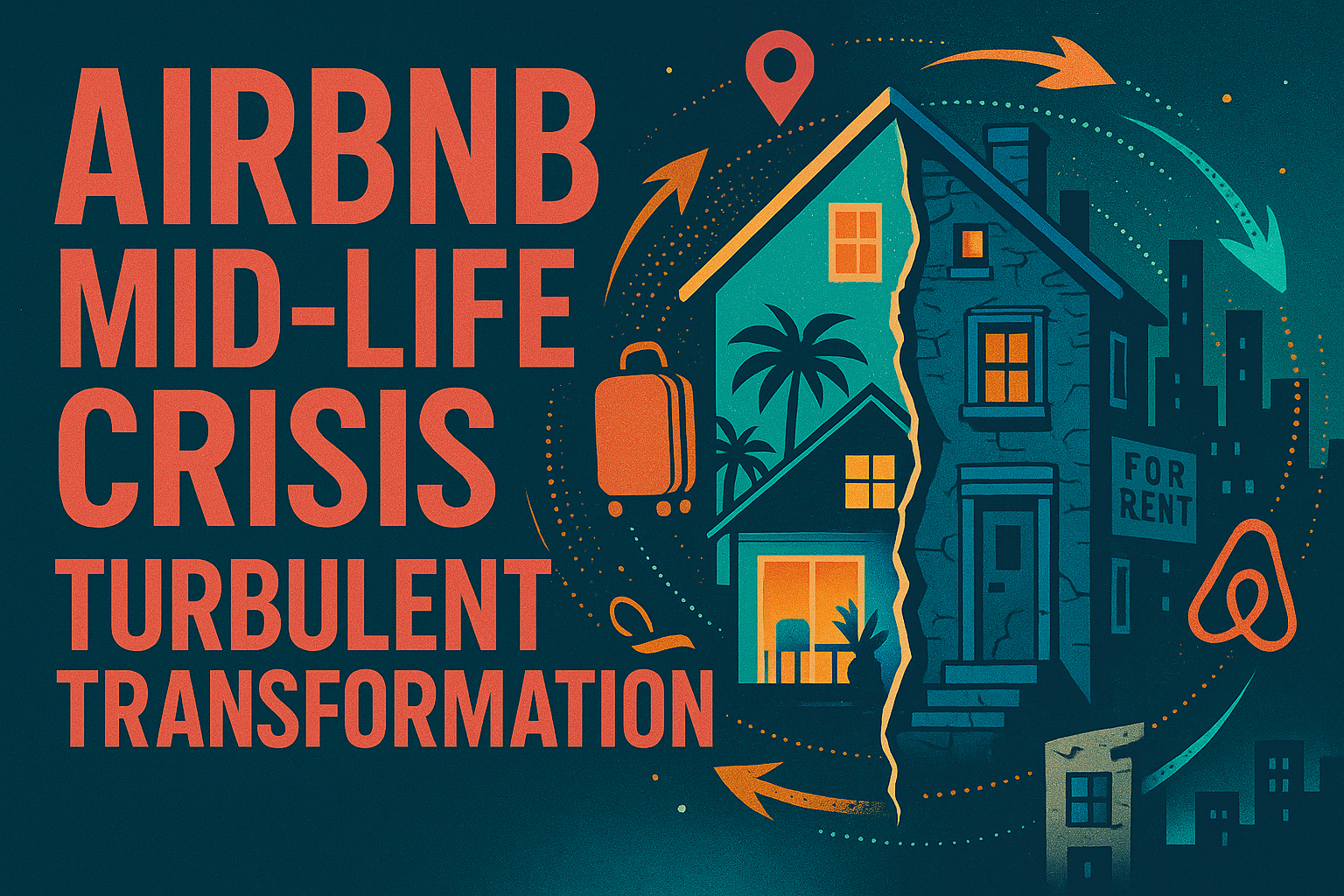At 17 years old, Airbnb finds itself at an inflection point that CEO Brian Chesky himself acknowledges feels like a corporate midlife crisis. The company that revolutionized travel by turning spare bedrooms into global accommodations now faces an identity crisis: Is it still the scrappy disruptor that promised authentic local experiences, or has it become just another corporate booking platform struggling with the mundane realities of market maturation?
The numbers tell a sobering story. Revenue growth has decelerated from pandemic recovery highs of 18% to just 6% in early 2025. Yahoo Finance +4 The stock has shed 23% of its value year-over-year. Meanwhile, viral TikTok videos mock the platform’s excessive cleaning fees and chore lists, God while cities from New York to Barcelona implement near-total bans on short-term rentals. CNN For a company once synonymous with millennial wanderlust, these are uncomfortable truths that suggest something fundamental has shifted in Airbnb’s trajectory.
The financial reality check
Airbnb’s Q1 2025 earnings revealed a company caught between robust fundamentals and concerning growth trends. While revenue reached $2.27 billion and the company generated an impressive $1.8 billion in free cash flow, the 6.1% year-over-year revenue growth marked a dramatic slowdown from the double-digit gains investors had grown accustomed to. Yahoo Finance +6 More troubling still, the company’s Q2 guidance of $2.99-3.05 billion fell below analyst expectations, sending the stock tumbling and raising questions about whether Airbnb’s hypergrowth phase has definitively ended. CNBC +3
The financial metrics paint a picture of a maturing business grappling with new realities. Net margins compressed from 12% to 7% year-over-year in Q1 2025, while operating margins plummeted to just 1.7% from 4.7% the previous year. Airbnb +2 Even as the company maintains an enviable 78% free cash flow margin and sits on $11.5 billion in cash with no debt, the market has responded skeptically to these mixed signals. AirbnbAirbnb Airbnb’s market capitalization has declined from over $100 billion to approximately $78-84 billion, reflecting investor uncertainty about the company’s future growth trajectory.
Wall Street analysts remain divided on Airbnb’s prospects. The consensus price target of $143 suggests modest upside potential, but the range from Deutsche Bank’s bearish $100 to Needham’s bullish $200 reflects fundamental disagreements about the company’s trajectory. TipRanksGuruFocus Bernstein Research argues the market pessimism is “overdone,” maintaining an outperform rating with a $185 target. TheStreet +2 Yet others point to structural headwinds that suggest Airbnb’s best days may be behind it.
The company’s attempts to maintain growth through international expansion show promise but haven’t fully offset domestic deceleration. Latin American markets grew over 20% while Asia-Pacific expanded in the mid-teens, yet these gains couldn’t prevent overall growth from slowing to single digits. Investing +2 With the US market representing Airbnb’s largest revenue source, the maturation of domestic demand poses significant challenges for maintaining the growth rates that justified the company’s premium valuation.
Regulatory warfare reaches critical mass
If financial deceleration represents Airbnb’s midlife malaise, regulatory crackdowns constitute its existential crisis. New York City’s Local Law 18, implemented in September 2023, delivered a body blow that reverberates throughout the industry. Norton The city that never sleeps essentially put Airbnb to bed, with listings plummeting 92% from 21,800 to under 4,600 within months. Associated PressLonely Planet Of 4,794 registration applications submitted, only 481 received approval. Associated Press The financial impact was immediate and severe: Airbnb lost $85 million in annual NYC revenue, while the broader economic impact reached $2.5 billion in reduced guest spending. The Real Deal
The New York model has become a template for cities worldwide seeking to reclaim housing stock and appease residents frustrated by neighborhood disruption. Barcelona announced a complete phase-out of short-term rentals by 2028, affecting 10,000 tourist licenses. Spain’s Constitutional Court upheld the ban in March 2025, validating the city’s authority to prioritize housing over tourism revenue. ReutersBloomberg Paris implemented strict registration requirements limiting rentals to principal residences with 120-day annual caps, while 20% of current listings operate illegally without proper licenses. euronewsShort Term Rentals
The regulatory onslaught extends beyond major tourist destinations. Amsterdam restricts rentals to 30 nights annually, Vienna allows only 90 days, and cities like Florence and Venice have frozen new listings entirely due to overtourism concerns. Flatio Even in traditionally business-friendly markets, Airbnb faces mounting pressure. Australia hit the company with potential $30 million fines for fee transparency violations, while Italy extracted a €576 million settlement for back taxes covering 2017-2021. Rental Scale-Up
Airbnb’s response has been a mix of legal challenges, lobbying efforts, and grudging compliance. The company spent a record $820,000 on federal lobbying in just the first nine months of 2023, Skift +2 yet legal victories remain elusive. Investing Courts have consistently sided with municipalities asserting their right to regulate short-term rentals, leaving Airbnb to navigate what one executive privately described as a “city-by-city, block-by-block guerrilla war” against local governments.
The cumulative impact of these restrictions fundamentally alters Airbnb’s growth calculus. Urban markets, which represent 34% of inventory and generate disproportionate revenue per booking, face the most severe constraints. As cities implement registration requirements, impose taxes, and enforce occupancy limits, the economics of hosting deteriorate, pushing supply toward less regulated but also less lucrative suburban and rural markets.
Competition intensifies across all fronts
While Airbnb battles regulators, competitors smell blood in the water. The company’s market share tells a story of both dominance and vulnerability. At 44% of the global short-term rental market, up from 28% in 2019, Airbnb appears to be consolidating its leadership position. Phocuswright +2 Yet beneath this headline number lurk concerning trends that suggest the competitive landscape has fundamentally shifted against the platform.
Booking.com has emerged as Airbnb’s most formidable challenger, leveraging its massive hotel inventory to cross-sell vacation rentals. The Amsterdam-based giant now commands 18% market share, up from 14% in 2019, Skift with particularly strong performance in Europe where it claims 48% share versus Airbnb’s 40%. Phocuswright +2 Booking’s integrated approach allows travelers to compare hotels and vacation rentals side-by-side, often revealing that hotels offer better value propositions once Airbnb’s fees are factored in.
VRBO, despite seeing its market share slip from 11% to 9%, Skift has successfully positioned itself as the premium alternative for family travelers. With average nightly rates of $324 for two-bedroom properties versus Airbnb’s $209, Lighthouse VRBO attracts a more affluent demographic seeking whole-home rentals for longer stays. The platform’s lower guest service fees and option for real security deposits appeal to both hosts and guests frustrated by Airbnb’s fee structure.
Perhaps most threatening to Airbnb’s long-term prospects is the hotel industry’s strategic response. Extended stay hotels, offering apartment-style accommodations with hotel amenities, grew to a $57.2 billion market in 2024 with projections to reach $143.2 billion by 2035. Major chains launched new brands specifically targeting Airbnb’s customer base: Wyndham’s WaterWalk, Choice Hotels’ Everhome Suites, and Hilton’s Project H3 all emphasize kitchenettes, separate living spaces, and competitive weekly rates while maintaining advantages in daily housekeeping, consistent quality standards, and professional maintenance.
The competitive pressure manifests in Airbnb’s pricing power erosion. NerdWallet analysis found hotels cheaper than comparable Airbnb rentals in 75% of markets once all fees are included. New SilverTravelboommarketing For stays under three nights, the math increasingly favors hotels, which don’t charge cleaning fees or require guests to strip beds and start dishwashers. One viral tweet by Jeremy Gordan, viewed over 7 million times, captured the shifting sentiment: “My growing preference for Holiday Inn over Airbnb is a leading indicator of middle age.” UPROXX
The user experience unravels
Nothing illustrates Airbnb’s midlife crisis more viscerally than its cratering user satisfaction scores. With a dismal 1.3-star rating on Trustpilot based on nearly 2,000 reviews, SitejabberNerdWallet the platform faces a full-scale revolt from both guests and hosts. The complaints paint a picture of a company that has lost touch with the user experience that once made it revolutionary.
The cleaning fee controversy has become Airbnb’s most visible failure. A TikTok video by @Melworeit garnered 66,000 views and 5,000 comments documenting a $125 cleaning fee accompanied by requirements to wash dishes, start laundry, take out trash, and strip beds. TechStory +3 The median cleaning fee of $75 for one-night stays NerdWallet often represents 25% or more of the total booking cost, creating sticker shock that drives customers back to hotels. Igms +3 While Airbnb’s pricing transparency initiatives led 300,000 listings to reduce or eliminate cleaning fees, approximately 90% of US properties still charge them, Airbnb perpetuating what customers perceive as a bait-and-switch pricing model. TechCrunch +2
Host profitability has collapsed in many markets, creating a vicious cycle of declining quality and service. Austin, Phoenix, and Myrtle Beach saw host profits drop over 40% between 2022 and 2023. New Silver Many superhosts report 50% fewer bookings despite maintaining high ratings, blaming algorithm changes that favor new listings over established performers. New SilverWithairbnb One host’s lament on Reddit captured the widespread frustration: “Way too many short-term rentals on the market with terrible hosts who undercut prices and provide awful experiences.”
The platform’s customer service has become legendary for all the wrong reasons. Trustpilot reviews consistently describe Airbnb support as “the worst customer service I have ever experienced,” with guests reporting endless loops of being transferred between representatives who appear to be reading from scripts. Short Term Rentals The company’s heavy reliance on offshore call centers and AI chatbots has created a support system that fails spectacularly when real problems arise. One analysis found 72.2% of Twitter complaints between 2015-2020 related to customer service failures. Short Term Rentals
Safety and scam issues compound the trust deficit. Despite removing 59,000 fake listings and preventing 157,000 fraudulent posts in 2023, scams remain endemic. Skift +3 Federal prosecutors indicted Shray Goel and Shaunik Raheja for an $8.5 million bait-and-switch scheme affecting 10,000 reservations across 100 properties. The scandal included a discriminatory element, with booking decisions partly based on racial prejudices. FOX 11 Los Angeles Even when not explicitly criminal, practices like listing the same property at multiple price points or demanding payment outside the platform have become disturbingly common.
The party house problem persists despite Airbnb’s 2020 ban on parties. While the company reports only 0.035% of reservations result in party allegations, with 448 million annual bookings, this translates to approximately 157,000 incidents yearly. Skift High-profile cases like “The Fun House” in Vista, California, which generated nearly 20 police calls, NBC 7 San Diego and a SWAT standoff at a Los Angeles Airbnb that resulted in one death, God fuel neighborhood opposition and regulatory crackdowns. Academic research from Cambridge University confirmed what residents long suspected: “Crime seems to go up as soon as Airbnbs appear, and stays elevated for as long as they are active.” Txneighborhoodcoalition
Chesky’s billion-dollar pivot
Faced with slowing growth and mounting challenges, Brian Chesky has embarked on the most ambitious strategic transformation in Airbnb’s history. Skift The May 13, 2025, Summer Release represents nothing less than an attempt to reinvent Airbnb from a accommodation platform into what Chesky calls an “everything app” for lifestyle and travel. Reuters +4 The scope of this pivot, backed by $200-250 million in new business investment for 2025 alone, reflects both the severity of Airbnb’s challenges and the audacity of its proposed solutions. MarketScreener +2
The centerpiece of this transformation is Airbnb Services, launching in 260 cities worldwide. Guests can now book vetted professionals—personal chefs, fitness trainers, massage therapists, stylists—directly through the platform. These services can be delivered to Airbnb properties or customers’ own homes, representing Airbnb’s first major expansion beyond travel. Investing +3 Early adoption data remains limited, but the company projects this vertical could generate over $1 billion annually within three years. Skift
Equally significant is the complete rebuild of Airbnb Experiences, expanded to 650 cities with 19 categories ranging from cooking classes to adventure sports. The relaunch includes “Airbnb Originals,” exclusive experiences with celebrities like Patrick Mahomes and Megan Thee Stallion, positioning the platform to compete with luxury concierge services. Skift +5 The rebuilt app, constructed on an entirely new technology stack, enables rapid feature deployment and AI-powered personalization that Chesky believes will differentiate Airbnb from commoditized booking platforms. MarketScreener +3
Chesky’s leadership philosophy, which he calls “founder mode,” has become increasingly hands-on as the company navigates its transformation. Inspired by Steve Jobs, Chesky involves himself deeply in product decisions while maintaining he doesn’t micromanage. Ohiosap +3 His decision to list his own San Francisco home on Airbnb, personally cooking dinner for guests, exemplifies his commitment to understanding the user experience firsthand. In a May 2025 podcast with Michelle Obama, Chesky framed this as returning to Airbnb’s roots while simultaneously pushing into new frontiers. Mix Vale
The acquisition of GamePlanner.AI for $200 million in late 2023 signals Airbnb’s AI ambitions. Led by Siri co-founder Adam Cheyer, the team is developing what Chesky describes as “the ultimate concierge,” an AI interface that could revolutionize trip planning and personalization. CNBC +2 Unlike competitors rushing to deploy basic chatbots, Airbnb has taken a measured approach, implementing AI for customer service (reducing human agent contact by 15%), fraud prevention (achieving 35% reduction in unwanted parties), and pricing optimization while developing more ambitious applications. TechCrunch +2
Yet questions remain about execution risk. Moving from a focused accommodation platform to a multi-vertical lifestyle marketplace requires capabilities Airbnb hasn’t previously demonstrated. The company must manage service provider quality across hundreds of cities, navigate new regulatory frameworks for service businesses, and compete with established players in each vertical. Critics note that previous attempts at diversification, including the original Experiences launch, failed to achieve meaningful scale. Substack
The economic context reshapes everything
Airbnb’s challenges unfold against a complex economic backdrop that simultaneously threatens and protects its business model. With inflation moderating but interest rates remaining elevated, consumer behavior has shifted in ways that create both headwinds and opportunities for the platform.
The macroeconomic environment has produced divergent impacts across Airbnb’s ecosystem. High interest rates have slowed new supply growth, with potential hosts unable to finance investment properties at attractive rates. This supply constraint has helped stabilize pricing in many markets, preventing the race-to-the-bottom price competition that threatened host profitability. Simultaneously, inflation-squeezed consumers increasingly view Airbnb’s total costs—nightly rates plus cleaning fees plus service charges—as prohibitive compared to hotel alternatives.
Travel patterns have fundamentally shifted post-pandemic. Remote work enables longer stays that favor Airbnb’s weekly and monthly discounts, yet the return to office mandates has reduced the “work from anywhere” demand that buoyed the platform during 2020-2021. Sec International travel has rebounded strongly, benefiting Airbnb’s global inventory, but currency fluctuations and economic uncertainty in key markets like China have limited growth potential.
The generational wealth transfer beginning to accelerate presents both opportunity and challenge. Millennials inheriting property may view Airbnb as a way to monetize real estate, potentially increasing supply. However, Gen Z travelers, shaped by economic uncertainty and social media narratives about Airbnb’s failures, show stronger preference for hotels and hostels that offer predictable pricing and experiences.
Most concerning for Airbnb is its sensitivity to discretionary spending cuts during economic downturns. Unlike business travel that powers hotel demand, Airbnb relies predominantly on leisure travelers who can defer or cancel trips when budgets tighten. SecCNBC With economists debating whether the US faces a soft landing or recession, Airbnb’s growth projections remain hostage to macroeconomic forces beyond its control.
Market saturation changes the game
The data reveals an uncomfortable truth: many of Airbnb’s most lucrative markets have reached saturation. US listings increased 8.9% between January 2023 and 2024 Lighthouse despite declining demand, creating oversupply that has devastated host economics. New SilverRental Scale-Up Markets like Dallas added over 6,000 rental units since 2020, with many struggling to achieve occupancy rates that support profitable operations. Hoststarter
The saturation problem is particularly acute in previous boom markets. Austin, Phoenix, and Myrtle Beach experienced 40% revenue per available room declines between May 2022 and May 2023. Orlando saw a 6.4% revenue decrease despite its tourist appeal. Even destination markets like Joshua Tree suffered 17% revenue declines as supply overwhelmed demand. New Silver The target occupancy rate of 60% that once seemed easily achievable now requires aggressive pricing that erodes profitability.
This oversupply has transformed Airbnb’s host ecosystem. The platform’s early promise of helping middle-class homeowners earn supplemental income has given way to professionalized operations. In Paris, 31.7% of hosts manage multiple listings, while corporate investors have purchased entire apartment buildings for short-term rental conversion. euronews This “hotelization” of Airbnb inventory undermines the authentic, peer-to-peer experiences that originally differentiated the platform. God
The quality crisis accompanying saturation may prove even more damaging long-term. As desperate hosts slash prices to maintain occupancy, they cut corners on maintenance and amenities. Airbnb removed 450,000 low-quality listings since 2023, Rental Scale-UpAirbnb but user reviews suggest problems persist. Airbnb +4 The race to the bottom in oversupplied markets creates a negative feedback loop: lower prices attract budget-conscious guests who leave poor reviews, further depressing bookings and forcing additional price cuts.
Geographic disparities in saturation create strategic dilemmas. While urban markets face oversupply and regulatory restrictions, rural and suburban markets often lack the demand density to support significant growth. Airbnb finds itself squeezed between oversaturated profitable markets and undersaturated unprofitable ones, with few Goldilocks markets offering both growth potential and attractive unit economics.
Technology promises and perils
Airbnb’s technology strategy reflects both its ambitions and limitations as it navigates middle age. The complete app rebuild on a new technology stack, encompassing over 535 features and upgrades, represents the most significant technical investment in company history. AirbnbAirbnb This foundation enables the rapid deployment of new services and AI capabilities that Chesky believes will differentiate Airbnb from increasingly commoditized competitors. Airbnb
The AI strategy, anchored by the GamePlanner.AI acquisition, takes a deliberately measured approach. Rather than rushing to deploy half-baked chatbots like many competitors, Airbnb has focused on practical applications with immediate impact. CNBCAirbnb AI-powered customer service has reduced human agent contacts by 15% while improving response times. Machine learning algorithms have achieved a 35% reduction in unwanted parties by identifying high-risk bookings. AlertstaysRental Scale-Up Dynamic pricing optimization helps hosts maximize revenue while maintaining competitive rates. AIM Research +2
Yet Airbnb’s technology advantages face erosion. Competitors have closed the gap in mobile apps and booking interfaces, while Google’s travel features increasingly surface alternative accommodations directly in search results. The commoditization of the booking experience means technology alone cannot sustain Airbnb’s premium valuation. The company must deliver genuinely innovative features that create lasting competitive moats.
The vision Chesky articulates—an AI “ultimate concierge” that plans entire trips—remains largely theoretical. Converting this vision into reality requires not just technical capability but massive amounts of quality data, partnerships across the travel ecosystem, and user behavior change. Theregister Previous attempts by tech giants to create comprehensive travel planning solutions have repeatedly failed, suggesting the challenge may be more about human psychology than technology.
Most critically, technology cannot solve Airbnb’s fundamental trust and quality problems. No algorithm can ensure hosts won’t cancel bookings, maintain property standards, or respond promptly to issues. The human elements that make or break travel experiences resist technological solutions, leaving Airbnb dependent on the same host behaviors that currently generate widespread complaints.
The battle for Airbnb’s soul
Beyond financial metrics and strategic pivots lies a deeper question: What does Airbnb want to be? The company’s evolution from scrappy startup enabling authentic local experiences to publicly traded corporation optimizing quarterly earnings has created identity confusion that manifests across every aspect of the business.
The original Airbnb promised to help travelers “belong anywhere,” fostering connections between hosts and guests that transcended transactional relationships. Accelingo +3 Early adopters shared meals with hosts, received local recommendations, and formed lasting friendships. This vision attracted hosts motivated by cultural exchange as much as income, creating the authentic experiences that differentiated Airbnb from sterile hotel chains.
Today’s reality bears little resemblance to this founding vision. Professional property managers dominate many markets, offering zero interaction beyond digital lock codes. Entire apartment buildings function as unofficial hotels, complete with key lockboxes and cleaning crews but none of the personal touches that once defined Airbnb. Guests increasingly treat properties as anonymous hotel rooms, while hosts view guests as revenue sources to be processed efficiently.
This transformation reflects broader tensions between growth and authenticity. Wall Street demands expanding margins and market share, pushing Airbnb toward standardization and scale. Yet standardization destroys the unique, variable experiences that attracted users initially. The company finds itself trying to serve two masters: public market investors seeking predictable returns and users yearning for unpredictable adventures.
Chesky’s strategic pivot toward services and experiences represents an attempt to recapture Airbnb’s original magic while satisfying growth demands. By expanding beyond accommodations, Airbnb can potentially recreate the human connections and authentic experiences that corporate-owned vacation rentals have eliminated. Skift Whether this strategy succeeds depends on Airbnb’s ability to maintain quality and authenticity at scale—the same challenge it failed to meet in accommodations.
The regulatory crackdowns forcing Airbnb back toward home-sharing rather than commercial operations may paradoxically help resolve this identity crisis. If commercial operators exit restricted markets, individual hosts sharing primary residences could restore the peer-to-peer dynamics Airbnb originally championed. This forced return to roots might sacrifice growth but preserve the soul that made Airbnb revolutionary.
Expert perspectives diverge sharply
Industry experts remain divided on whether Airbnb faces genuine crisis or natural maturation. Bernstein Research maintains its bullish outlook, arguing market pessimism is “overdone” with a $185 price target. Their analysts highlight Airbnb’s dominant market position, strong cash generation, and international growth potential TheStreet as evidence the company remains fundamentally healthy despite near-term headwinds. Investing
Conversely, skeptics point to structural challenges that transcend normal business cycles. The convergence of regulatory restrictions, market saturation, competitive pressure, and user dissatisfaction creates compound risks that threaten Airbnb’s business model. These experts argue Airbnb’s premium valuation reflects past success rather than future potential, making the stock vulnerable to continued multiple compression.
Academic researchers studying platform economics offer nuanced perspectives. Harvard Business School case studies position Airbnb as following predictable patterns of platform evolution: explosive early growth, market saturation, strategic diversification. Hbs This lens suggests Airbnb’s challenges reflect natural maturation rather than company-specific failures. The critical question becomes whether management can successfully navigate the transition from growth to value creation.
Travel industry veterans express particular concern about Airbnb’s customer experience deterioration. Skift’s analysis notes that while Airbnb maintains category leadership, user sentiment has shifted dramatically negative. The platform risks becoming another commoditized booking site unless it addresses quality control and trust issues. Industry insiders suggest Airbnb has 12-18 months to reverse perception trends before reputational damage becomes permanent.
Financial analysts focus on unit economics and growth sustainability. With revenue growth decelerating to single digits and margins compressing, Airbnb must either reignite growth or dramatically improve profitability to justify current valuations. The $200-250 million investment in new businesses represents a bet that diversification can create new growth vectors, but execution risk remains high given Airbnb’s mixed track record beyond core accommodations. Ainvest
Looking ahead to an uncertain future
Airbnb stands at a crossroads that will determine whether its midlife crisis becomes a successful reinvention or slow decline. The company’s response over the next 24 months will likely set its trajectory for the decade ahead.
The bull case envisions Airbnb successfully transforming into a comprehensive lifestyle platform. Services and experiences generate billions in new revenue streams. AI-powered personalization creates unmatched travel planning capabilities. TipRanks Financial International expansion unlocks massive growth in underpenetrated markets. Regulatory pressure forces quality improvements that restore user trust. The stock re-rates higher as investors recognize a transformed business model with multiple growth drivers.
The bear case sees continued execution struggles amid mounting challenges. New business lines fail to achieve scale while distracting from core accommodation problems. Regulatory restrictions spread globally, shrinking addressable markets. Competition from hotels and OTAs intensifies price pressure. User experience continues deteriorating as professional operators dominate supply. Growth stalls permanently while margins compress, forcing valuation multiples toward traditional hospitality levels.
The most likely scenario incorporates elements of both extremes. Airbnb muddles through with modest growth, selectively succeeding in new initiatives while struggling with legacy challenges. The company remains profitable and cash-generative but loses its growth premium. International expansion partially offsets domestic saturation. Regulatory pressure forces positive changes in some markets while constraining opportunity in others.
Critical factors to monitor include regulatory developments in major markets, adoption rates for new services, competitive responses from hotels and OTAs, and user satisfaction metrics. The pace of international expansion and success of AI initiatives will determine whether Airbnb can reignite growth. Most importantly, the company must address fundamental trust and quality issues that threaten its brand value.
Conclusion: Crisis or chrysalis?
Airbnb’s midlife crisis is real but not necessarily terminal. The company faces genuine challenges that threaten its historical growth trajectory and premium valuation. Sec Regulatory warfare, market saturation, intense competition, and user experience deterioration create compound headwinds that management cannot wish away. The financial deceleration from 18% to 6% growth reflects fundamental business maturation rather than temporary setbacks. SkiftAirbnb
Yet crisis often catalyzes transformation. Chesky’s ambitious pivot toward becoming an “everything app” for lifestyle and travel, while risky, demonstrates willingness to fundamentally reimagine Airbnb’s future. Reuters +2 The company’s strong financial position—$11.5 billion in cash, no debt, robust free cash flow—provides resources to fund transformation. Airbnb +3 Market leadership in short-term rentals creates a foundation for adjacent expansion.
The ultimate question is whether Airbnb can execute its vision while addressing core platform problems. Success requires simultaneously improving the accommodation experience, launching new business lines, navigating regulatory challenges, and restoring user trust. Few companies successfully manage such complex transformations, but few companies have disrupted entire industries as Airbnb has.
Perhaps most importantly, Airbnb must decide what it wants to be. The tension between authentic peer-to-peer experiences and standardized corporate efficiency cannot be permanently sustained. Sec Either Airbnb embraces its evolution into a traditional hospitality company with technology advantages, or it recommits to the revolutionary vision of helping people belong anywhere. This choice, more than any strategic initiative or financial metric, will determine whether Airbnb’s midlife crisis becomes a new beginning or the beginning of the end.
The next 24 months will prove decisive. If Airbnb successfully launches new revenue streams while fixing core platform issues, current valuations may prove conservative. If execution falters amid mounting challenges, the stock could face continued pressure as growth permanently decelerates. For investors, travelers, and hosts alike, Airbnb’s midlife crisis represents both risk and opportunity. The only certainty is that the Airbnb emerging from this transformation will look fundamentally different from the company that pioneered home-sharing 17 years ago.
Whether that transformation revitalizes or diminishes one of the sharing economy’s greatest success stories remains to be written. But one thing is clear: Airbnb’s midlife crisis is forcing long-overdue reckonings with fundamental questions about growth, authenticity, and purpose that will reshape the platform—and possibly the entire travel industry—for years to come.







![Meta's $300 million gamble reshapes the AI talent wars Meta has launched the most aggressive talent acquisition campaign in technology history, offering individual compensation packages up to $300 million over four years to elite AI researchers. CNBC +7 This unprecedented strategy, coupled with $60-65 billion in infrastructure investments for 2025, represents Mark Zuckerberg's all-in bet to transform Meta from an AI follower into the leader in the race toward superintelligence. Data Center Dynamics +5 The campaign has successfully recruited dozens of top researchers from OpenAI, Google DeepMind, and Apple, while fundamentally disrupting compensation norms across the entire AI industry and raising critical questions about talent concentration and the future of AI development. CNBC +8 The $300 million figure decoded: Individual packages, not aggregate spending The widely reported "$300 million AI brain drain" figure represents individual compensation packages for elite AI researchers over four-year periods, not Meta's total spending on talent acquisition. Gizmodo +3 According to Fortune's July 2025 reporting, "Top-tier AI researchers at Meta are reportedly being offered total compensation packages of up to $300 million over four years, with some initial year earnings exceeding $100 million." Fortune Yahoo Finance These packages primarily consist of restricted stock units (RSUs) with immediate vesting, rather than traditional signing bonuses, as Meta CTO Andrew Bosworth clarified: "the actual terms of the offer wasn't a sign-on bonus. It's all these different things." CNBC +2 The compensation structure includes base salaries up to $480,000 for software engineers and $440,000 for research engineers, Fortune supplemented by massive equity grants and performance bonuses. Fortune SmythOS Specific examples include Ruoming Pang from Apple receiving $200+ million over several years Fortune and Alexandr Wang from Scale AI receiving $100+ million as part of Meta's $14.3 billion investment in Scale AI. Fortune +3 OpenAI CEO Sam Altman confirmed these figures on the "Uncapped" podcast, stating Meta made "giant offers to a lot of people on our team, you know, like $100 million signing bonuses, more than that (in) compensation per year." CNBC +6 This compensation strategy emerged after Meta's Llama 4 model underperformed expectations in April 2025, prompting Zuckerberg to take personal control of recruitment. CNBC +3 The CEO maintains a "literal list" of 50-100 elite AI professionals he's targeting, making direct phone calls to recruit them. Fortune +5 While not every hire receives nine-figure packages—typical offers range from $10-18 million annually—the peak compensation levels have redefined industry standards and forced competitors to dramatically increase their retention spending. TechCrunch Meta raids the AI elite: Key acquisitions from competitors Meta's talent acquisition campaign has systematically targeted the architects of competitors' most successful AI models, with particular focus on researchers with expertise in reasoning models, multimodal AI, and foundation model training. SmythOS Fortune The company has successfully recruited 11+ researchers from OpenAI, including several co-creators of ChatGPT and the o-series reasoning models. South China Morning Post +4 Notable acquisitions include Shengjia Zhao, named Chief Scientist of Meta Superintelligence Labs in July 2025, who co-created ChatGPT, GPT-4, and all mini models; CNN Trapit Bansal, a key contributor to OpenAI's o1 reasoning model who pioneered reinforcement learning approaches; TechCrunch TechCrunch and Hongyu Ren, co-creator of GPT-4o, o1-mini, and o3. CNBC +2 From Google DeepMind, Meta secured Jack Rae, the pre-training tech lead for Gemini who also led development of Gopher and Chinchilla; Pei Sun, who led post-training, coding, and reasoning for Gemini after creating Waymo's perception models; Fortune CNBC and multiple other Gemini contributors. CNBC Silicon UK The Apple raid centered on Ruoming Pang, head of Apple's AI foundation models team who led Apple Intelligence development, along with three senior team members including distinguished engineer Tom Gunter. MacDailyNews +4 These acquisitions follow a clear strategic pattern: Meta is targeting researchers with proven expertise in areas where it has fallen behind, particularly reasoning models and multimodal AI. SmythOS The recruits often move as cohesive teams—for instance, the OpenAI Zurich office researchers Lucas Beyer, Alexander Kolesnikov, and Xiaohua Zhai all joined Meta together. TechCrunch TechCrunch This team-based approach accelerates Meta's ability to replicate successful research methodologies while disrupting competitors' ongoing projects. The talent flow has created significant disruption at source companies. OpenAI's Chief Research Officer Mark Chen described the exodus in an internal memo: "I feel a visceral feeling right now, as if someone has broken into our home and stolen something." Yahoo! +2 Apple's AI strategy faced major setbacks after losing its foundation models leadership, forcing a reorganization under Craig Federighi and Mike Rockwell. MacRumors Superintelligence ambitions drive massive infrastructure buildout Meta's creation of the Meta Superintelligence Labs (MSL) in June 2025 represents a fundamental reorganization of its AI efforts under unified leadership. Led by Alexandr Wang as Chief AI Officer and Nat Friedman heading AI products and applied research, MSL consolidates all AI research with the explicit goal of achieving "personal superintelligence for everyone." CNBC +2 Zuckerberg's internal memo declared: "As the pace of AI progress accelerates, developing superintelligence is coming into sight. I believe this will be the beginning of a new era for humanity." CNBC +2 The infrastructure investments supporting this ambition dwarf anything previously attempted in corporate AI research. Meta committed $60-65 billion for 2025 alone, representing a 50% increase from 2024, with plans for "hundreds of billions of dollars" in coming years. Data Center Dynamics +7 The company is constructing two revolutionary data centers that abandon traditional designs for speed-focused "tent" infrastructure. The Prometheus Cluster in Ohio will provide 1 gigawatt of capacity by 2026, featuring on-site natural gas generation through two 200MW plants to bypass grid limitations. The Hyperion Cluster in Louisiana represents an even more ambitious undertaking: a 2GW facility scaling to 5GW, covering an area "the size of most of Manhattan" with a $10 billion investment on 2,250 acres. Opportunity Louisiana +5 Meta's technical infrastructure includes 1.3+ million GPUs targeted by end of 2025, utilizing prefabricated power and cooling modules for rapid deployment and sophisticated workload management to maximize utilization. PYMNTS +3 The company has shifted its research focus from traditional AGI to what Chief AI Scientist Yann LeCun calls "Advanced Machine Intelligence" (AMI), arguing that human intelligence is specialized rather than generalized. Columbia Engineering AI Business Current research priorities span computer vision (Perception Encoder, Meta Locate 3D), foundation models (continued Llama development despite setbacks), world models for predicting action outcomes, and collaborative AI for multi-agent reasoning. Meta meta The Llama 4 "Behemoth" model's failure—attributed to chunked attention creating blind spots and economically unviable inference—led to a strategic pivot toward smaller, more efficient variants while the new superintelligence team addresses fundamental research gaps. CNBC +4 The talent war escalates: Compensation packages reach athlete-level extremes The AI talent war has created compensation dynamics unprecedented in technology history, with packages now exceeding those of professional athletes and Wall Street executives. Meta's aggressive offers have forced industry-wide salary inflation, with typical AI researcher packages at major labs now ranging from $2-10 million annually. Ainvest +4 OpenAI responded to defections by jumping stock compensation 5x to $4.4 billion company-wide, offering $2+ million retention bonuses with one-year commitments and $20+ million equity deals to prevent key departures. Fortune +3 Despite Meta's financial firepower, retention data reveals that money alone doesn't guarantee loyalty. Meta maintains only a 64% retention rate, the lowest among major AI labs, while experiencing 4.3% annual attrition to competitors. SmythOS The Register In contrast, Anthropic achieves an 80% retention rate with more modest compensation ($311K-$643K range) by emphasizing mission-driven culture and researcher autonomy. The Register +6 The data shows an 8:1 ratio of OpenAI departures favoring Anthropic over the reverse, suggesting that purpose and product quality matter as much as pay. signalfire Analytics India Magazine The compensation arms race extends beyond individual packages to strategic "acqui-hires." Google executed a $2 billion deal to bring back Noam Shazeer and the Character.AI team, while Microsoft absorbed most of Inflection AI for $650 million. Fortune Fortune These deals allow companies to acquire entire teams while potentially avoiding regulatory scrutiny of traditional acquisitions. Geographic concentration intensifies the competition, with 65% of AI engineers located in San Francisco and New York. signalfire However, emerging hubs like Miami (+12% AI roles) and San Diego (+7% Big Tech roles) are beginning to attract talent with compensation at 83-90% of Bay Area levels. Fortune The elite talent pool remains extremely constrained, with experts estimating only 2,000 people worldwide capable of frontier AI research, driving the extreme premiums for proven expertise. The Register Fortune Industry experts divided on Meta's bold strategy Industry analysis reveals deep divisions about Meta's approach and its implications for AI development. SemiAnalysis characterizes the compensation packages as making "top athlete pay look like chump change," with typical offers of "$200M to $300M per researcher for 4 years" representing "100x that of their peers." CFRA analyst Angelo Zino views the acquisitions as necessary long-term investments: "You need those people on board now and to invest aggressively to be ready for that phase of generative AI development." Yahoo! CNBC Academic researchers express concern about the broader implications. MIT's Neil Thompson and Nur Ahmed warn that by 2020, "nearly 70% of AI Ph.D. holders were recruited by industry, up from only 21% in 2004," creating a troubling brain drain that "leaves fewer academic researchers to train the next generation." MIT Sloan Brookings They argue this concentration could "push to the sidelines work that's in the public interest but not particularly profitable," including research on AI bias, equity, and public health applications. MIT Sloan Competitors have responded with varying strategies. Google relies on personal intervention from leadership, with co-founder Sergey Brin "personally calling an employee and offering them a pay rise to stay," while maintaining advantages in computing power and proprietary chips. Fortune +2 Microsoft has "tied its AI fate to OpenAI" while building in-house capabilities, even reviving the Three Mile Island nuclear plant to power AI operations. PYMNTS OpenAI faces the most direct impact, with Sam Altman criticizing Meta's approach as "distasteful" and arguing that "missionaries will beat mercenaries." CNBC +6 The venture capital community sees Meta's strategy accelerating market consolidation. HSBC Innovation Banking reports that "42% of U.S. venture capital was invested into AI companies in 2024," EY with compensation inflation making it increasingly difficult for startups to compete. Menlo Ventures' Tim Tully notes that "Stock grants for these scientists can range between $2 million to $4 million at a Series D startup. That was unfathomable when I was hiring research scientists four years ago." Fortune Policy experts worry about innovation concentration. The Brookings Institution recommends "direct support to keep [academic researchers] from leaving for industry" and "more open immigration policies" to broaden the talent pool. Brookings Some propose international collaboration similar to CERN to ensure more distributed AI development and prevent unhealthy concentration of capabilities in a few corporations. MIT Sloan Conclusion Meta's $300 million talent acquisition gambit represents more than aggressive recruitment—it's a fundamental bet that concentrating elite AI talent through unprecedented compensation can overcome technical disadvantages and establish superintelligence leadership. Early results show mixed success: while Meta has successfully recruited dozens of top researchers and committed massive infrastructure investments, the company still faces the lowest retention rate among major AI labs and continued technical challenges with its foundation models. The Register +2 The strategy has irrevocably transformed the AI talent landscape, normalizing eight and nine-figure compensation packages while accelerating the concentration of expertise in a handful of well-funded laboratories. Fortune Axios This concentration may accelerate progress toward AGI but raises critical questions about research diversity, academic sustainability, and the public interest in AI development. As one MIT researcher noted, industry benchmarks now drive the entire field's research agenda, potentially sidelining work on bias, equity, and public applications. Meta's ultimate success will depend not just on financial resources but on its ability to create a mission-driven culture that retains talent and translates unprecedented human capital investment into breakthrough capabilities. Computerworld +2 With competitors matching compensation while maintaining advantages in culture (Anthropic), infrastructure (Google), or partnerships (Microsoft), Meta's superintelligence ambitions face significant challenges despite unlimited financial backing. The Register The AI talent wars have entered a new phase where money is necessary but insufficient—and where the concentration of capabilities in corporate hands may fundamentally reshape not just the industry but the trajectory of human technological development.](https://news.envychip.com/wp-content/uploads/2025/07/Gwum3dibgAYIuX--480x480.jpeg)
